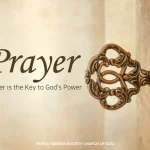*“Christianity: A Global Faith, Not a ‘White Man’s Religion'” “Debunking the Myth of Christianity as Cultural Imperialism”*
The idea of Christianity as a form of cultural imperialism is inaccurate and unfair.
Christianity is a global faith with roots in many different cultures, and that it has been embraced by people all over the world.
One of the first major non-European cultures to embrace Christianity was the Ethiopian Empire. Christianity began to spread in Ethiopia in the 4th century, and it became the official religion of the empire in the 6th century. So Christianity has a long history in Africa, and it’s not something that was imposed on the continent by Europeans.
In fact, Ethiopia’s ancient churches, such as the Lalibela Rock-Hewn Churches, are some of the oldest Christian sites in the world.
Christianity actually originated in the Middle East, in what is now Israel and Palestine. The founder of Christianity, Jesus, was a Middle Eastern man who was born in Bethlehem and grew up in Nazareth.
Christianity began as a small sect of Judaism, but it quickly spread throughout the Roman Empire and beyond. So from the very beginning, Christianity was not just a “white man’s religion.”
Calling Christianity a “white man’s religion” is not only misleading but offensive.
The phrase implies that Christianity is only for white people, and that it’s somehow separate from or superior to other religions. But that’s simply not true. Christianity is open to everyone, regardless of race, ethnicity, or culture. It’s a universal faith that can be adapted to any context.
Those making this claim are only trying to shake people’s faith by making them feel like they’re betraying their culture or heritage by being Christian.
But I think it’s important to remember that faith is a personal choice, and that you can still hold onto your culture and traditions while also embracing your faith as a Christian.
And it’s worth remembering that Christianity actually spread throughout the world because of the efforts of missionaries from many different cultures and backgrounds, not just Europeans.
It’s true that Christianity was brought to many parts of the world by European missionaries, and that this history can be complicated and controversial. But I think it’s also important to remember that Christianity is a faith that transcends any particular culture or ethnicity. It’s about universal values like love, compassion, and justice.
And I think it’s possible to hold onto your culture and traditions while still embracing the values of Christianity.
Often, people don’t have a full understanding of the history of Christianity, and they may not know that it actually originated in the Middle East, not Europe. And sometimes, people may try to use this misunderstanding to manipulate others or to make them feel ashamed of their faith.
But I think it’s important to remember that Christianity is not about where it originated or what race or culture it’s associated with. It’s about the values it teaches.
Let’s look at another example, Christianity came to Japan in the 16th century, and it gained a significant following despite facing persecution.
It was outlawed in the 17th century, but it continued to thrive underground. Today, there are over a million Christians in Japan, and many of them incorporate elements of Japanese culture into their faith.
For example, some Christians in Japan celebrate Christmas by eating fried chicken and strawberry shortcake, rather than the traditional Western fare. They have found ways to make Christianity their own, and to make it work within their own culture.
Another fascinating example is the Philippines. Christianity was first brought to the Philippines in the 16th century by Spanish missionaries, and it took hold very quickly.
Today, around 90% of Filipinos are Christians, and the faith has become deeply intertwined with Filipino culture. Many Filipinos incorporate Catholic traditions into their own indigenous beliefs, creating a unique blend of religious practices.
It’s a perfect example of how Christianity can adapt to and influence local cultures, rather than erasing them.
The majority of people in Israel are Jewish, and only about 2% of the population is Christian. Many Israelis see Christianity as a “foreign” religion, and they are often wary of missionaries and other forms of proselytizing.
But it’s important to remember that Christianity has its roots in Israel, and it was originally a Middle Eastern faith. So the complex relationship between Israel and Christianity is another key part of the story.
One of the most interesting things about the relationship between Christianity and Israel is the role of the Holy Land. For Christians, the Holy Land is a place of pilgrimage and spiritual connection. But for Israelis, the Holy Land is simply their home.
The two groups have very different relationships with the land, which can sometimes cause tension and misunderstanding.
But there are also many examples of cooperation and coexistence between Christians and Israelis. It’s a complex and often misunderstood relationship, but it’s an important part of the story of Christianity.
Christianity is a universal faith, and it belongs to everyone, not just one group of people. It’s a global religion that has taken on different forms in different parts of the world.
Everyone is welcome to embrace Christianity, no matter where they’re from or what their background is.
The idea that Christianity is a form of “cultural imperialism,” or that it’s been used to control and dominate other cultures does not and cannot hold water for any right thinking persons because Christianity has also been a source of liberation and empowerment for many people around the world.
In fact, some of the most important Christian figures, like Martin Luther King Jr. and Nelson Mandela, were explicitly fighting against oppression and inequality.
One of the most powerful arguments against the idea of Christianity as cultural imperialism is the role of indigenous people in spreading the faith.
In places like Latin America and sub-Saharan Africa, Christianity was often spread by local people, not foreign missionaries.
These people embraced the religion because they saw it as a way to make sense of their world and find meaning in their lives.
They weren’t being forced to convert, but were choosing to do so because it resonated with their values and beliefs. This shows that Christianity is not just a Western religion, but has been adapted and embraced by people all over the world.
Absolutely! We can expand on the idea that religions like Christianity is constantly evolving and adapting to new contexts. For example, Christianity has taken on new forms in the digital age, with the rise of online communities and social media platforms. And this has opened up new possibilities for people to connect and learn about Christianity, and it has created new challenges and opportunities for the faith.
This goes a long way to show that Christianity is a living, breathing religion that is constantly changing and growing.
“Christianity is not a static, unchanging religion. It is constantly evolving and adapting to new contexts. In the digital age.
As Christianity continues to evolve, it will be important to remember that it is a religion that values respect, understanding, and pluralism.
In conclusion, it cannot be over emphasized the importance of religious freedom and pluralism in Christianity.
While people may have different beliefs, they should still be able to live together in peace and mutual respect. And it’s clear that the diversity of religions and cultures is something to be celebrated, not feared.















More Stories
The Power of a Mind Illuminated by the Light and Word of Christ
Cutting Off the Horns of the Wicked: A Biblical Exploration of Psalm 75:10
Refined with Afflictions in God’s Refinery